

On the Improvement of the Understanding (1662) Table of Contents. Notice to the Reader. Sacred Texts Philosophy Spinoza Index Previous Next Buy this Book at Amazon.com On the Improvement of Understanding, by Benedict de Spinoza, [1883], at sacred-texts.com [Notice to the Reader.]
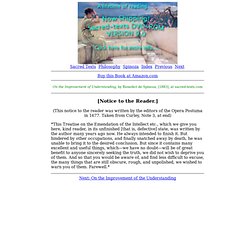
On the Improvement of the Understanding. Sacred Texts Philosophy Spinoza Index Previous Next Buy this Book at Amazon.com On the Improvement of Understanding, by Benedict de Spinoza, [1883], at sacred-texts.com [1] (1) After experience had taught me that all the usual surroundings of social life are vain and futile; seeing that none of the objects of my fears contained in themselves anything either good or bad, except in so far as the mind is affected by them, I finally resolved to inquire whether there might be some real good having power to communicate itself, which would affect the mind singly, to the exclusion of all else: whether, in fact, there might be anything of which the discovery and attainment would enable me to enjoy continuous, supreme, and unending happiness.
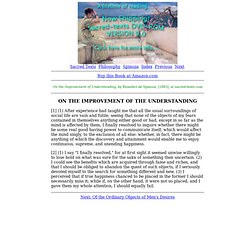
Of the Ordinary Objects of Men's Desires. Of the True and Final Good. Sacred Texts Philosophy Spinoza Index Previous Next Buy this Book at Amazon.com On the Improvement of Understanding, by Benedict de Spinoza, [1883], at sacred-texts.com [12] (1) I will here only briefly state what I mean by true good, and also what is the nature of the highest good. (2) In order that this may be rightly understood, we must bear in mind that the terms good and evil are only applied relatively, so that the same thing may be called both good and bad according to the relations in view, in the same way as it may be called perfect or imperfect. (3) Nothing regarded in its own nature can be called perfect or imperfect; especially when we are aware that all things which come to pass, come to pass according to the eternal order and fixed laws of nature.
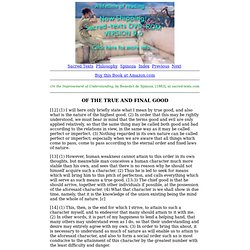
Certain Rules of Life. Sacred Texts Philosophy Spinoza Index Previous Next Buy this Book at Amazon.com On the Improvement of Understanding, by Benedict de Spinoza, [1883], at sacred-texts.com [17] (1) Yet, as it is necessary that while we are endeavoring to attain our purpose, and bring the understanding into the right path we should carry on our life, we are compelled first of all to lay down certain rules of life as provisionally good, to wit the following:—I. (2) To speak in a manner intelligible to the multitude, and to comply with every general custom that does not hinder the attainment of our purpose. (3) For we can gain from the multitude no small advantages, provided that we strive to accommodate ourselves to its understanding as far as possible: moreover, we shall in this way gain a friendly audience for the reception of the truth.
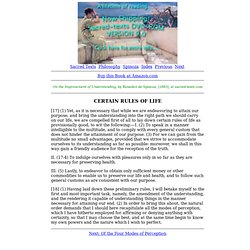
II. (17:4) To indulge ourselves with pleasures only in so far as they are necessary for preserving health. Of the Four Modes of Perception. Sacred Texts Philosophy Spinoza Index Previous Next Buy this Book at Amazon.com On the Improvement of Understanding, by Benedict de Spinoza, [1883], at sacred-texts.com [19] (1) Reflection shows that all modes of perception or knowledge may be reduced to four:—I. (2) Perception arising from hearsay or from some sign which everyone may name as he please.
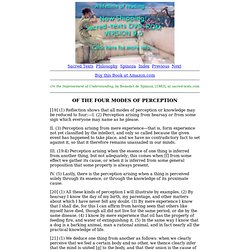
II. (3) Perception arising from mere experience—that is, form experience not yet classified by the intellect, and only so called because the given event has happened to take place, and we have no contradictory fact to set against it, so that it therefore remains unassailed in our minds. III. (19:4) Perception arising when the essence of one thing is inferred from another thing, but not adequately; this comes when [f] from some effect we gather its cause, or when it is inferred from some general proposition that some property is always present. Of the Best Mode of Perception. Sacred Texts Philosophy Spinoza Index Previous Next Buy this Book at Amazon.com On the Improvement of Understanding, by Benedict de Spinoza, [1883], at sacred-texts.com [25] (1) In order that from these modes of perception the best may be selected, it is well that we should briefly enumerate the means necessary for attaining our end.
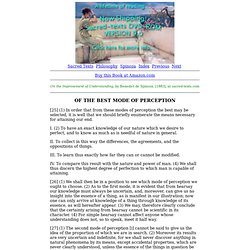
I. (2) To have an exact knowledge of our nature which we desire to perfect, and to know as much as is needful of nature in general. II. III. IV. Of the Unstruments of the Intellect, or True Ideas. Sacred Texts Philosophy Spinoza Index Previous Next Buy this Book at Amazon.com On the Improvement of Understanding, by Benedict de Spinoza, [1883], at sacred-texts.com.
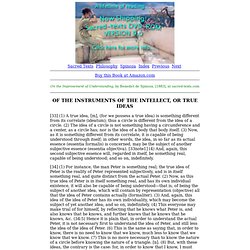
Answers to Objections. Sacred Texts Philosophy Spinoza Index Previous Next Buy this Book at Amazon.com On the Improvement of Understanding, by Benedict de Spinoza, [1883], at sacred-texts.com [43] (1) It may, perhaps, provoke astonishment that, after having said that the good method is that which teaches us to direct our mind according to the standard of the given true idea, we should prove our point by reasoning, which would seem to indicate that it is not self-evident. (2) We may, therefore, be questioned as to the validity of our reasoning. (3) If our reasoning be sound, we must take as a starting-point a true idea. (4) Now, to be certain that our starting-point is really a true idea, we need proof. (5) This first course of reasoning must be supported by a second, the second by a third, and so on to infinity.
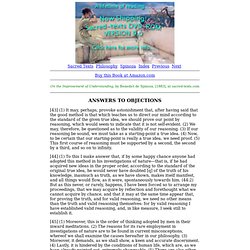
Next: Distinction of True Ideas From Fictitious Ideas. First Part of Method. Sacred Texts Philosophy Spinoza Index Previous Next Buy this Book at Amazon.com On the Improvement of Understanding, by Benedict de Spinoza, [1883], at sacred-texts.com [51] (1) Meanwhile, I give warning that I shall not here give essence of every perception, and explain it through its proximate cause. (2) Such work lies in the province of philosophy. (3) I shall confine myself to what concerns method—that is, to the character of fictitious, false and doubtful perceptions, and the means of freeing ourselves therefrom. (4) Let us then first inquire into the nature of a fictitious idea. [54] (1) Whence it follows that if there be a God, or omniscient Being, such an one cannot form fictitious hypotheses. (2) For, as regards ourselves, when I know that I exist, [s] I cannot hypothesize that I exist or do not exist, any more than I can hypothesize an elephant that can go through the eye of a needle; nor when I know the nature of God, can I hypothesize that He or does not exist.
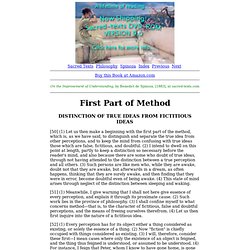
And From False Ideas. Sacred Texts Philosophy Spinoza Index Previous Next Buy this Book at Amazon.com.
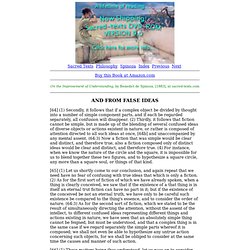
Of Doubt. Sacred Texts Philosophy Spinoza Index Previous Next Buy this Book at Amazon.com On the Improvement of Understanding, by Benedict de Spinoza, [1883], at sacred-texts.com [77] (1) Thus far we have treated of the false idea. We have now to investigate the doubtful idea—that is, to inquire what can cause us to doubt, and how doubt may be removed. (2) I speak of real doubt existing in the mind, not of such doubt as we see exemplified when a man says that he doubts, though his mind does not really hesitate. (77:3) The cure of the latter does not fall within the province of method, it belongs rather to inquiries concerning obstinacy and its cure. Next: Of Memory and Forgetfulness. Of Memory and Forgetfulness. Sacred Texts Philosophy Spinoza Index Previous Next Buy this Book at Amazon.com On the Improvement of Understanding, by Benedict de Spinoza, [1883], at sacred-texts.com [81] (1) These are the points I promised to discuss in the first part of my treatise on method. (2) However, in order not to omit anything which can conduce to the knowledge of the understanding and its faculties, I will add a few words on the subject of memory and forgetfulness. (81:3) The point most worthy of attention is, that memory is.
Mental Hindrances from Words. Sacred Texts Philosophy Spinoza Index Previous Next Buy this Book at Amazon.com On the Improvement of Understanding, by Benedict de Spinoza, [1883], at sacred-texts.com [86] (1) Hence, as far as is possible at the outset, we have acquired a knowledge of our understanding, and such a standard of a true idea that we need no longer fear confounding truth with falsehood and fiction. (2) Neither shall we wonder why we understand some things which in nowise fall within the scope of the imagination, while other things are in the imagination but wholly opposed to the understanding, or others, again, which agree therewith. (3) We now know that the operations, whereby the effects of imagination are produced, take place under other laws quite different from the laws of the understanding, and that the mind is entirely passive with regard to them.
Next: Its Object, the Acquisition of Clear and Distinct Ideas. Second Part of Method. Its Means, Good Definitions-Coditions of Definition. How to Define Understanding. Endnotes. Short treatise on God, man & his well-being (1660) Ethics (1677) 1- Of God. 2- Of the Mind. Proof. --Will and understanding are nothing beyond the individual volitions and ideas (II. xlviii. and note). But a particular volition and a particular idea are one and the same (by the foregoing Prop.); therefore, will and understanding are one and the same. Q.E.D. Note. --We have thus removed the cause which is commonly assigned for error. 1. 2. 3- Of Emotions. 4- Of Human Bondage or the Strength of Emotions. PROP. I. No positive quality possessed by a false idea is removed by the presence of what is true, in virtue of its being true. Proof.-- Falsity consists solely in the privation of knowledge which inadequate ideas involve ( II. xxxv. ), nor have they any positive quality on account of which they are called false ( II. xxxiii. ); contrariwise, in so far as they are referred to God, they are true ( II. xxxii. ).
5- Of Human Freedom. IEP Overview. Stanford Overview. 1. Biography Bento (in Hebrew, Baruch; in Latin, Benedictus: all three names mean "blessed") Spinoza was born in 1632 in Amsterdam. He was the middle son in a prominent family of moderate means in Amsterdam's Portuguese-Jewish community. As a boy he had undoubtedly been one of the star pupils in the congregation's Talmud Torah school.
He was intellectually gifted, and this could not have gone unremarked by the congregation's rabbis.